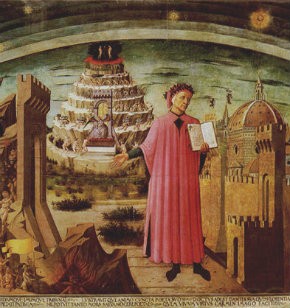Rhymes and reasons

It was 700 years ago, many scholars believe—in the 12th year of Dante’s exile from Florence—that the Inferno first saw the light of day. Thirteen fourteen: the year has a sprightly sound, hinting at upcoming sequels, and the Italian l’anno mille trecento quattordici has just the right number of syllables (11) to form the first line of a Dantean tercet. I imagine a second year following and a third year rhyming until, year by year, carried along by Dante’s ingenious interlocking terza rima, we are brought to the present moment, duemila quattordici, still marveling at a poem that from link to link makes paradise rhyme with hell.
But does paradise rhyme with hell? Setting aside the cliché about the Inferno being more interesting than the Paradiso, any serious reader will find a deep unity of theme running throughout the hundred-canto trilogy, from Dante’s promise “to treat of the good that I found there” (Inferno 1:8) to the final canto, which T. S. Eliot deemed “the highest point that poetry has ever reached or ever can reach.” Eliot has yet to be proven wrong; the poem deserves its canonical status on a shelf below the Bible and above the ranks of merely literary classics. To borrow a word from Dante, the Divine Comedy, if we are willing to read it whole, imparadises the mind.
Though the poem has a deep unity, the tradition of its interpretation does not; and to read the Divine Comedy in English—ideally with the Italian close at hand—is to step into a stream roiled by rival literary and religious movements. Romantics rescued Dante from centuries of neglect, relishing his high fantasy, symbolist theology, esoteric eroticism and political courage. Henry Cary created the definitive Victorian English Commedia in Miltonic blank verse, a version championed by Samuel Coleridge and cherished by John Ruskin, for whom Dante was “the central man of all the world,” perfectly harmonizing intellect, imagination and will.




